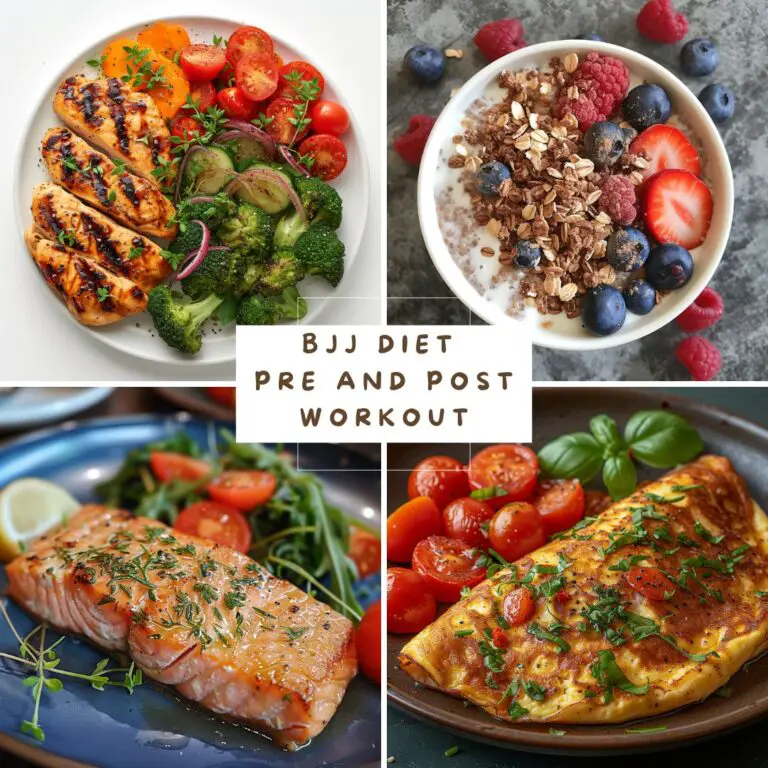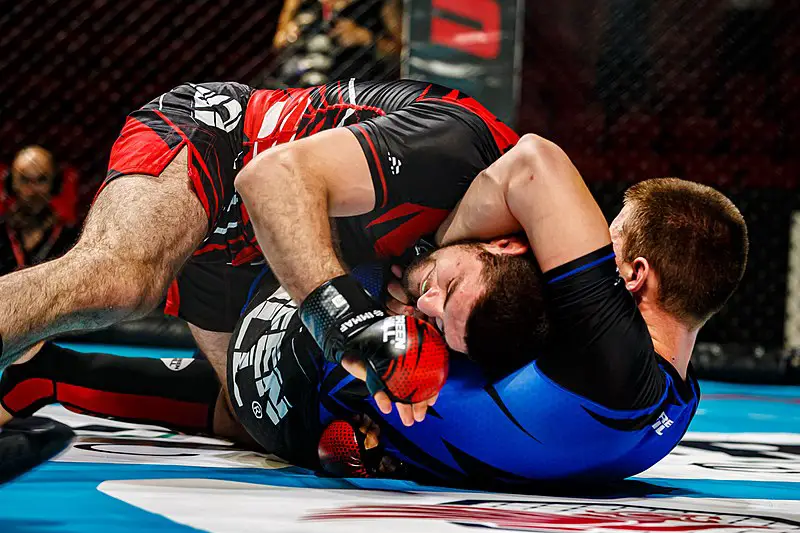Discover the comprehensive guide on the BJJ diet, what to eat before and after the workout, meal examples, and a complete BJJ diet plan that will boost your performance on the mats.
What To Eat Before a BJJ Workout?
Eat a balanced meal that includes carbohydrates, protein, and fats at least 2–3 hours before training. The focus should be on balanced nutrition that provides sufficient energy, hydrates the body, and is easy to digest.
- Carbohydrates — provide energy for your workout. Opt for complex carbs for sustained energy like oats, brown rice, quinoa, or whole wheat bread.
- Protein — helps with muscle repair and growth. Choose lean proteins such as chicken breast, turkey, fish, tofu, or legumes.
- Fats — are essential for overall health but should be consumed in moderation before training as they take longer to digest.
- Hydration — drink plenty of water throughout the day and consider an electrolyte drink if the session is going to be an intense one.
Pre-Workout Meal Ideas for BJJ
1. Grilled Chicken and Quinoa Bowl
Grilled chicken breast, quinoa, steamed broccoli.
This meal provides lean protein from the chicken, complex carbohydrates from the quinoa, and essential vitamins and minerals from the broccoli. It’s a balanced meal that can be eaten 2–3 hours before training to give sustained energy and support muscle recovery.
2. Greek Yoghurt with Berries and Honey
Greek yogurt, mixed berries (such as blueberries, and strawberries), and a drizzle of honey.
Yoghurt is rich in protein, while the berries provide quick-digesting carbohydrates and antioxidants. The honey adds a natural sweetness and an extra quick energy boost. This meal is light and can be consumed 30–60 minutes before training.
3. Peanut Butter and Banana on Whole-Grain Toast
Whole-grain bread, natural peanut butter, and a banana.
The whole-grain toast provides complex carbohydrates, the banana offers easily digestible carbs and potassium, and the peanut butter adds a bit of protein and healthy fats. This combination fuels your body with a quick and sustained energy release, suitable for consumption 1–2 hours before training.
What To Eat After a BJJ Workout?
Within 30 minutes to 2 hours post-training, consume a meal or snack that includes a good mix of protein and carbohydrates.
- Protein – Helps repair and build muscle tissue. Aim for about 20–30 grams of protein post-workout. The meal should include lean protein such as chicken, turkey, or salmon.
- Carbohydrates — Replenishes glycogen stores used during training. Opt for both simple and complex carbs like whole grain oats, rice, potato or wheat bread.
- Fats — Can be included but should not dominate the post-workout meal. Add some avocado slices or olive oil.
- Hydration — Rehydrate with water and consider electrolyte drinks if you’ve had an intense workout.
Post-Workout Meal Ideas For BJJ
Here are three basic post-workout meal ideas for BJJ, each with a simple and short explanation:
1. Grilled Chicken Salad
Grilled chicken breast, mixed greens (spinach, lettuce, arugula), cherry tomatoes, cucumber, and balsamic vinaigrette.
Chicken provides lean protein for muscle repair, while salad greens and vegetables offer vitamins, minerals, and hydration. The balsamic vinaigrette adds flavour without excess calories.
2. Turkey and Veggie Omelette
Eggs, sliced turkey breast, bell peppers, onions, spinach, feta cheese (optional).
Eggs are rich in protein and essential amino acids, promoting muscle recovery. Adding turkey and vegetables enhances the protein and nutrient content. This meal is quick to prepare and customizable based on personal preferences.
3. Salmon with Quinoa and Steamed Broccoli
Grilled or baked salmon fillet, quinoa, steamed broccoli.
Salmon provides omega-3 fatty acids and high-quality protein for muscle repair and anti-inflammatory benefits. Quinoa offers complex carbs and fiber, while broccoli adds vitamins, minerals, and antioxidants. This meal is balanced and satisfying, perfect for replenishing energy stores after a workout.
Pre-BJJ workout snacks
Here are some simple and effective pre-BJJ workout snacks that will provide you with the energy and nutrients needed for an intense training session:
1. Banana with Almond Butter
One banana, 1–2 tablespoons of almond butter.
Bananas provide quick-digesting carbohydrates and potassium, while almond butter adds a bit of protein and healthy fats. This combination offers a quick energy boost and sustains you through your workout.
2. Greek Yogurt with Honey and Berries
1 cup of Greek yogurt, 1 tablespoon of honey, a handful of mixed berries (blueberries, strawberries, raspberries).
Greek yogurt is rich in protein, while honey provides quick carbohydrates. The berries add fiber, vitamins, and antioxidants, making this snack both nutritious and easy to digest.
3. Whole-Grain Toast with Peanut Butter
One slice of whole-grain bread, 1–2 tablespoons of peanut butter.
The whole-grain toast offers complex carbohydrates for sustained energy, and peanut butter provides protein and healthy fats. This snack is easy to prepare and can help keep you energized throughout your BJJ session.
4. Apple Slices with Cheese
One apple, a few slices of cheddar or mozzarella cheese.
Apples provide simple carbohydrates and fiber, while cheese adds protein and fat, creating a balanced snack that fuels your workout without being too heavy.
5. Protein Smoothie
1 scoop of protein powder, 1 banana, a handful of spinach, 1 cup of almond milk, a tablespoon of chia seeds.
This smoothie is quick to make and packed with protein, carbohydrates, and essential nutrients. The protein powder aids muscle preparation, the banana offers quick carbs, spinach provides vitamins and minerals, and chia seeds add fiber and healthy fats.
6. Oatmeal with Fruit
1/2 cup of rolled oats, 1 cup of water or milk, a handful of sliced strawberries or blueberries.
Oatmeal is a great source of complex carbohydrates and fiber to your BJJ diet, providing sustained energy. Adding fruit enhances the snack with natural sugars and vitamins. This is a great option if you have a bit more time before your workout (about an hour).
BJJ Diet Plan (Daily Eating Plan)
Creating a daily BJJ diet plan requires a focus on balanced nutrition to support energy levels, recovery, and overall health. Here’s a sample daily eating plan that includes meals and snacks to keep you fueled throughout the day:
Breakfast
- Oatmeal with Berries and Nuts
- 1 cup rolled oats
- 1 cup almond milk or water
- A handful of mixed berries (blueberries, strawberries, raspberries)
- 1–2 tablespoons of chopped nuts (almonds, walnuts)
- 1 tablespoon of honey (optional)
Explanation: Provides complex carbohydrates for sustained energy, fiber, antioxidants, and healthy fats to start the day.
Mid-Morning Snack
- Greek Yogurt with Honey and Banana
- 1 cup Greek yogurt
- 1 tablespoon honey
- 1 sliced banana
Explanation: Rich in protein and quick-digesting carbohydrates, perfect for a mid-morning energy boost.
Lunch
- Grilled Chicken Salad
- 4–6 oz grilled chicken breast
- Mixed greens (spinach, arugula, lettuce)
- Cherry tomatoes, cucumber, bell peppers
- 1/4 avocado, sliced
- Olive oil and balsamic vinegar dressing
Explanation: A balanced meal with lean protein, healthy fats, and plenty of vegetables for vitamins and minerals.
Afternoon Snack (Pre-Workout)
- Whole-Grain Toast with Peanut Butter and Apple Slices
- 1 slice whole-grain bread
- 2 tablespoons peanut butter
- 1 apple, sliced
Explanation: Provides complex carbs, protein, and fiber to sustain you through your afternoon workout.
Post-Workout Snack
- Protein Smoothie
- 1 scoop protein powder (whey or plant-based)
- 1 banana
- A handful of spinach
- 1 cup almond milk
- 1 tablespoon chia seeds
Explanation: Quick and easy to digest, this smoothie replenishes protein and carbs to aid muscle recovery.
Dinner
- Salmon with Quinoa and Steamed Broccoli
- 4–6 oz grilled or baked salmon
- 1 cup cooked quinoa
- 1–2 cups steamed broccoli
Explanation: Salmon provides high-quality protein and omega-3 fatty acids, quinoa offers complex carbs and fiber, and broccoli supplies essential vitamins and minerals.
Evening Snack
- Cottage Cheese with Pineapple
- 1 cup cottage cheese
- 1/2 cup pineapple chunks (fresh or canned in juice)
Explanation: Cottage cheese is rich in casein protein, which helps with muscle repair overnight. Pineapple adds a touch of sweetness and vitamins.
BJJ Hydration — How To Stay Hydrated
Support your BJJ diet with proper hydration. Aim to drink water consistently throughout the day rather than trying to catch up right before training. Aim for at least 8–10 cups (2–2.5 litres) of water daily, adjusting for factors like climate and activity level.
Pre-training, drink about 16–20 ounces (500–600 ml) of water to ensure you start training well-hydrated. Then, Drink another 8–10 ounces (240–300 ml) to top off your hydration levels 30 minutes before training.
During Training, take small amounts of water every 15–20 minutes during training. Aim for about 7–10 ounces (200–300 ml) per 20 minutes of exercise. For intense or prolonged sessions (over an hour), consider an electrolyte drink to replace lost salts and minerals. Look for drinks with sodium, potassium, magnesium, and calcium.
Post-training, drink 16–24 ounces (500–700 ml) of water for every pound (0.45 kg) of body weight lost during training. Weigh yourself before and after training to determine fluid loss. If you sweat heavily, use an electrolyte drink or eat foods rich in electrolytes like bananas, oranges, and leafy greens.
Signs of Dehydration
Pale yellow urine indicates good hydration, while dark yellow or amber urine suggests dehydration. Look out for signs such as dry mouth, dizziness, fatigue, and headache, which indicate the need for more fluids.
How Many Calories BJJ Burns?
On average, BJJ burns between 500 and 900 calories per hour of training. However, the exact number depends on individual factors such as weight, intensity of the session and many other.
here’s an estimate of the calories burned per hour of BJJ training for different body weights:
Light Training (Drills, Light Rolling):
- 150 lbs (68 kg): ~500–600 calories/hour
- 180 lbs (82 kg): ~600–700 calories/hour
- 210 lbs (95 kg): ~700–800 calories/hour
Moderate Training (Mix of Drills and Sparring):
- 150 lbs (68 kg): ~600–700 calories/hour
- 180 lbs (82 kg): ~700–800 calories/hour
- 210 lbs (95 kg): ~800–900 calories/hour
Intense Training (Hard Sparring, Competition Prep):
- 150 lbs (68 kg): ~700–800 calories/hour
- 180 lbs (82 kg): ~800–900 calories/hour
- 210 lbs (95 kg): ~900–1000 calories/hour
Example Calculation
To get a more specific estimate, you can use the Metabolic Equivalent of Task (MET) values. BJJ typically has a MET value of around 10 for moderate to intense training.
Calculation Formula:
Calories Burned=MET value×weight in kg×duration in hoursCalories Burned=MET value×weight in kg×duration in hours
Example for a 180 lb (82 kg) individual training for 1.5 hours:
Calories Burned=10×82×1.5=1230 caloriesCalories Burned=10×82×1.5=1230 calories
Final Thoughts on the BJJ Diet
A well-rounded BJJ diet is crucial for getting the most out of your work on the mats. Emphasize balanced meals rich in lean proteins, complex carbohydrates, and healthy fats to fuel your training sessions and promote recovery.
Stay hydrated by drinking water consistently throughout the day and incorporating electrolyte-rich foods. Adjust your diet based on your training intensity and personal needs to maintain optimal performance and overall health.
By prioritizing nutrition, you’ll enhance your endurance, strength, and recovery, giving you a competitive edge on the mat.


